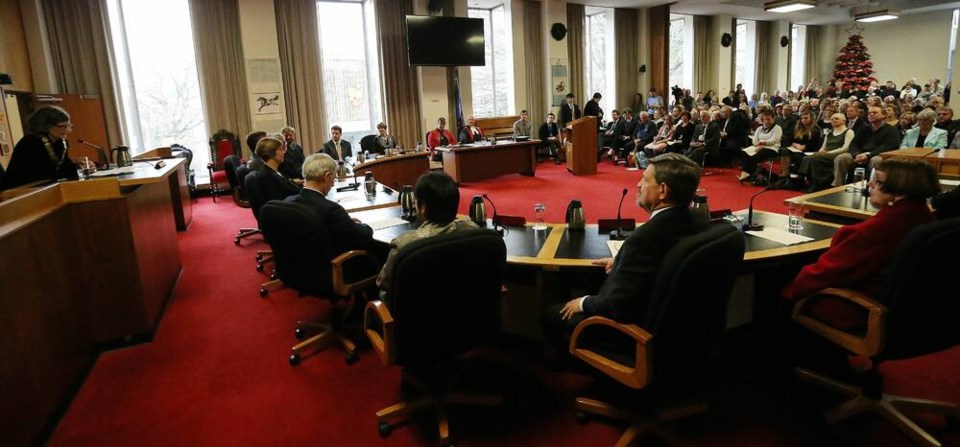Shirley Ackland has experience in municipal politics.
She served three terms on Port McNeill council, including one as mayor, before moving to Langford 2½ years ago, not long after the death of her husband Pat Horgan, the premier’s brother.
Having wound up a 34-year career as a college instructor, and having volunteered on Langford’s transportation committee and with the community’s efforts to help Ukrainians, Ackland has decided to run for council there this fall.
Except Langford isn’t Port McNeill, where Ackland was well known. “Nobody knows me,” she acknowledges. Down here, she’ll need to build a profile. And that will be an obstacle for any challenger for one of the 93 seats on the 13 municipal councils in the capital region Oct. 15.
To repeat: 93 seats. Or 126 if you count the four school boards and the three rural seats of the Capital Regional District.
That’s not an election, it’s Where’s Waldo. Good luck standing out from the crowd.
That’s why, even though the race doesn’t officially begin for another month, many challengers have already declared their intention to run. Candidates may only file their papers between Aug. 30 and Sept. 9, but little-known newcomers who wait until then to declare their intentions risk being too late to get their messages out, their names known.
The dance card is already starting to fill up in Victoria where — with councillors Marianne Alto and Stephen Andrew vying for the mayor’s chair being vacated by Lisa Helps, and incumbents Charlayne Thornton-Joe and Sharmarke Dubow bowing out — at least four of the eight councillors’ seats will be filled by newcomers.
Dave Thompson declared his candidacy in November, Matt Dell came out of the gate in mid-June, and Rafael Fuentes did so on the weekend. How well do you know their names, or what they stand for?
How about Jeremy Caradonna, or Jordan Quitzou, or filmmaker Krista Loughton, whose documentary Us and Them focused on homelessness and addiction in Victoria, or Janice Williams, already up to her ears in a Twitter debate over current council policies on housing, transportation and other issues? Also in the mix is Stephen Hammond, the council critic who came second to Helps in a 10-horse mayoral race in 2018.
Meanwhile, climate scientist and former sa���ʴ�ý Green Party leader Andrew Weaver has been gleefully (and not so gleefully) scoffing at Victoria council on social media – for example, posting photos of empty picnic tables at Clover Point — leading to speculation that he’ll enter the fray, too. Weaver, in no hurry to end the speculation, has neither confirmed nor denied he’ll run. That’s the benefit of already having a high profile, of knowing that people already have an impression of who you are and what you believe in. No need to enter the race early (if you are, in fact, running).
Lesser-known names don’t have that luxury. They have to get out there knocking on doors (which can be problematic in a pandemic).
But that’s the reality for the likes of Ackland, entering a contest that already features five candidates – Mark Morley, Colby Harder, Keith Yacucha, Kimberly Guiry and Mary Wagner — listed on the website of Langford Now, a group that is out to challenge the status quo in their community.
Similar story in Saanich, where non-incumbents vying to make an impression as they seek seats at the council table include youthful Basil Langevin, community organizer Teale Phelps Bondaroff, author/UVic instructor/playwright/filmmaker/orca advocate Mark Leiren-Young and Rishi Sharma, who ran for the Liberals in the last provincial election.
The process is starting to ramp up. The City of Victoria put its nomination package for prospective council candidates online last week. Nanaimo is making its nomination info available at city hall starting today.
Saanich’s version will be available early this month. Esquimalt’s can be picked up at the municipal hall or requested by sending an email to [email protected]. Sooke, where packages are now available at the municipal office, is holding an information session for prospective candidates Aug. 11. And so on.
To run, you must be a Canadian citizen, have turned 18 by Oct. 15 and have lived in sa���ʴ�ý for at least six months before the day nominations close.
You don’t need to live in the municipality you’re running in, though. Nor are you limited to just one. (In fact, perennial political activist/candidate David Shebib ran for mayor in all 13 capital region municipalities in 2014.)
But if you’re an outsider looking to becoming known, you do need to start campaigning before the campaign.
>>> To comment on this article, write a letter to the editor: [email protected]




